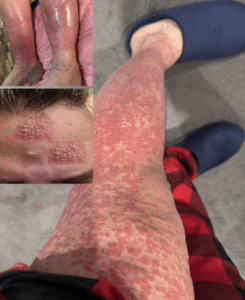These are the consequences of sleeping with wet hair—something many people do without realizing the potential effects it can have on their health. While it might seem harmless or even convenient, going to bed with wet hair can lead to a range of issues, both mild and more serious, depending on your overall health, hair care routine, and environment.
1. Scalp Issues and Fungal Infections
One of the biggest risks of sleeping with wet hair is creating a moist environment on your pillow and scalp. This dampness can foster the growth of fungi and bacteria, which thrive in dark, warm, and humid places. Over time, this can lead to scalp infections such as dandruff, ringworm, or even folliculitis—an inflammation of the hair follicles that can be painful and itchy.
2. Increased Hair Breakage
Wet hair is significantly more fragile than dry hair. When you lie down with damp strands pressed against your pillow, the friction between your hair and the fabric can lead to tangling, splitting, and breakage. Over time, this can result in thinner, more brittle hair with a rougher texture and less shine.
3. Worsened Allergies
If you suffer from allergies, especially dust mites or mold, sleeping with wet hair can aggravate them. The dampness on your pillow may increase humidity levels, making your sleeping environment more hospitable for allergens like dust mites or mold spores. This can lead to sneezing, nasal congestion, itchy eyes, or even skin rashes.
4. Sinus Problems and Headaches
Though not universally proven, some people report experiencing sinus pressure or headaches after sleeping with wet hair. In colder environments or air-conditioned rooms, the cool moisture on your scalp can cause constriction of blood vessels, leading to discomfort, tension headaches, or sinus issues in those who are sensitive.
5. Increased Risk of Cold or Flu
While getting sick from being cold is a myth on its own, sleeping with wet hair may lower your core body temperature slightly in certain conditions. This doesn’t cause illness directly but can weaken your immune system’s response, making you more susceptible to infections if you’ve already been exposed to a virus.
6. Unpleasant Odor
Wet hair left unventilated overnight can develop an unpleasant smell by morning. This is often due to bacteria and product buildup reacting to the damp environment, resulting in a musty or sour odor that can be hard to remove even with regular washing.
7. Hair Styling Problems
From a purely cosmetic point of view, sleeping with wet hair often leads to messy, unpredictable results in the morning. Flat spots, frizz, uneven waves, and odd kinks can make styling more difficult and time-consuming.
8. Skin Irritation
If your damp hair touches your face or neck while you sleep, it can cause irritation or breakouts, especially if you have sensitive skin or use heavy hair products. The water can carry hair oils, conditioner residues, or bacteria to your skin, clogging pores or triggering acne.
How to Minimize These Risks
If you must go to bed with wet hair, here are a few precautions to take:
- Use a microfiber towel or cotton T-shirt to remove excess moisture before lying down.
- Sleep on a silk or satin pillowcase to reduce friction.
- Avoid tight hairstyles that can stress your scalp while wet.
- Apply a leave-in conditioner or protective serum to prevent damage.
- Make sure your bedroom is not overly humid or cold.
While it might not always cause serious problems, regularly sleeping with wet hair is not recommended, especially if you already have scalp or skin sensitivities. Letting your hair air dry fully or using a hair dryer before bed is a safer option in the long term.


